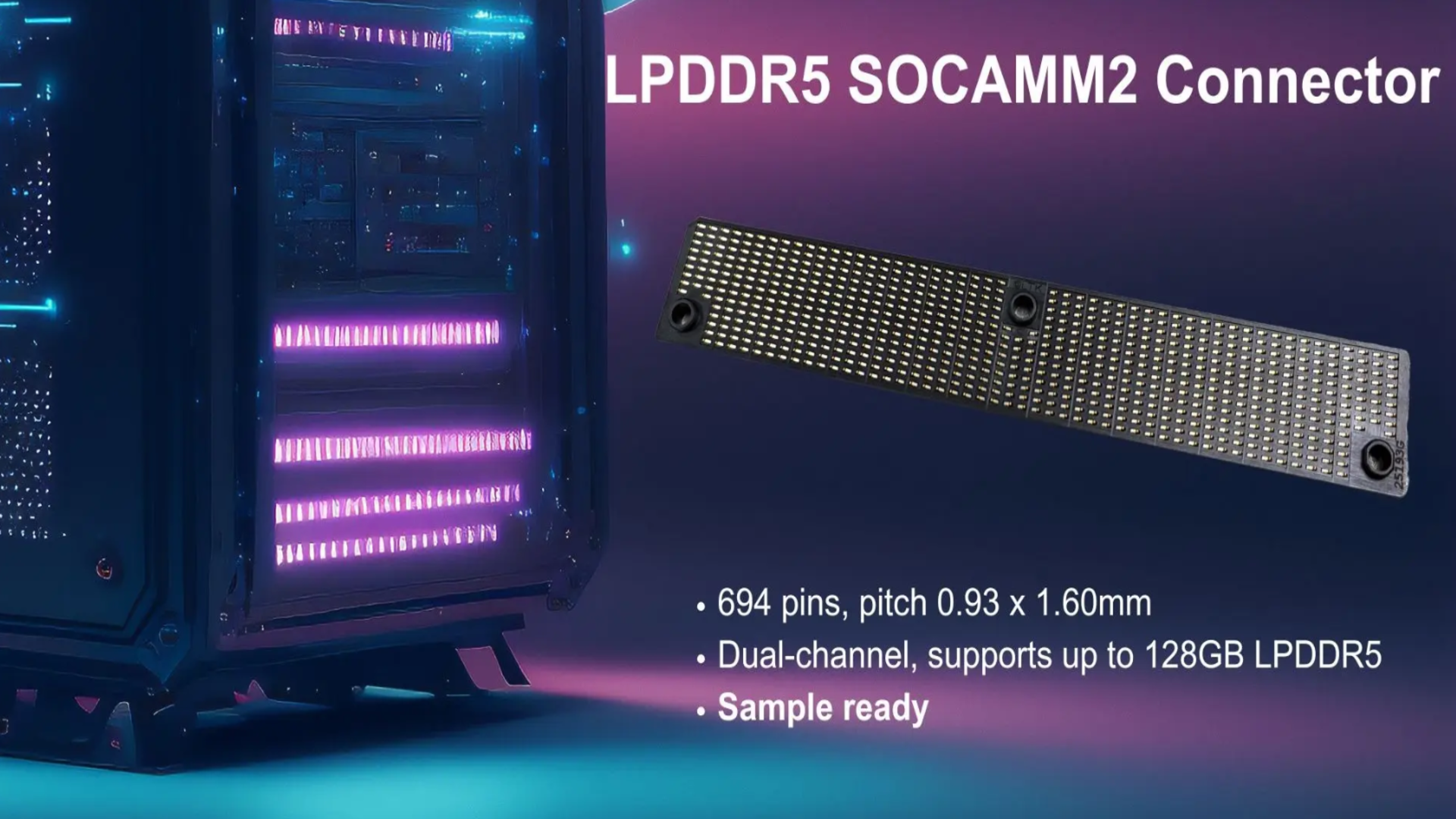Nvidia’s revolutionary memory format for AI GPUs could come to other platforms, rivaling LPDDR6 on the horizon
By Efosa Udinmwen
Copyright techradar

Skip to main content
Tech Radar Pro
Tech Radar Gaming
Close main menu
the business technology experts
België (Nederlands)
Deutschland
North America
US (English)
Australasia
New Zealand
View Profile
Search TechRadar
Expert Insights
Website builders
Web hosting
Best web hosting
Best office chairs
Best website builder
Best antivirus
Expert Insights
Don’t miss these
The best DDR5 RAM in 2025
LPDDR6 likely to debut in 2026 as JEDEC publishes new standard document and targets mobile devices and AI – desktop PCs and workstations will have to wait
After Sandisk, D-Matrix is proposing an intriguing alternative to the big HBM AI puzzle with 10x better performance with 10x better energy efficiency
Samsung’s biggest rival and Sandisk have come together to standardize High Bandwidth Flash memory – which could mean better AI performance for everyone
Samsung and AMD made a revolutionary SSD together – then it was left to wither in the shadows and nobody knows exactly why
The world’s fastest SSD has been announced, but it won’t fit in a PC — Micron 9650 is the first PCIe Gen6 SSD and will reach 28GB/s in sequential read
SK Hynix’s HBM4 will be the first out of the gate for Nvidia’s Rubin AI GPU, leaving Samsung and Micron in its wake
Towards the Giga IOPS pipedream: How Nvidia wants to reach 100 million IOPS – even if it means inventing totally new types of memory
Gigabyte quietly releases a GPU-type card that adds 1TB RAM to your workstation, but it will absolutely not be cheap
The next stage in AI power? XConn set to reveal end-to-end PCIe Gen 6 offering higher bandwidth than ever
Rising prices of DDR4, DDR5, GDDR6 RAM set to cause havoc on PC, smartphone and GPU prices – and no, AI is not the one to be blamed
Next-gen PCIe 6.0 SSD to reach 512GB in capacity and 28GBps in performance, almost 2X faster than PCIe 5.0, but I can’t see it reaching my desktop PC before 2030
Storage and memory Holy Grail gets massive boost with new partnership: UltraRAM inches closer to industrial production of NAND and DRAM killer
Second 246TB SSD confirmed for 2026 as Micron unveils 122TB 6600 ION PCIe Gen 5 SSD in a bid to replace hard disk drives in data centers
Kioxia demonstrates ultra fast SSD that uses innovative tech to deliver a staggering 64GBps on PCIe Gen6 – and no, it’s not coming to a PC near you anytime soon
Nvidia’s revolutionary memory format for AI GPUs could come to other platforms, rivaling LPDDR6 on the horizon
Efosa Udinmwen
19 September 2025
Complete Reset: Samsung and SK Hynix are preparing SOCAMM 2 sample production alongside Micron
When you purchase through links on our site, we may earn an affiliate commission. Here’s how it works.
(Image credit: The Guru of 3D)
Nvidia scrapped SOCAMM 1 after repeated failures to meet expectations
SOCAMM 2 promises faster transfer speeds reaching 9,600 MT/s performance
LPDDR6 adoption discussions signal scalability beyond current SOCAMM 2 modules
Nvidia has abandoned its earlier effort to commercialize SOCAMM 1 after repeated technical problems and is now focused entirely on SOCAMM 2, reports have claimed.
The first version was positioned as a low-power, high-capacity memory alternative for AI servers, but delays and design setbacks prevented it from gaining traction.
Now, an industry insider told ET News (originally in Korean), “Nvidia originally planned to introduce SOCAMM 1 within the year, but technical issues halted the project twice, preventing any actual large-scale orders.”
You may like
LPDDR6 likely to debut in 2026 as JEDEC publishes new standard document and targets mobile devices and AI – desktop PCs and workstations will have to wait
After Sandisk, D-Matrix is proposing an intriguing alternative to the big HBM AI puzzle with 10x better performance with 10x better energy efficiency
Samsung’s biggest rival and Sandisk have come together to standardize High Bandwidth Flash memory – which could mean better AI performance for everyone
A shift in performance and design goals
This reset means that Samsung Electronics, SK Hynix, and Micron are all starting on the same footing with the second-generation design.
SOCAMM 2 maintains the detachable module form factor with 694 I/O ports, but increases transfer speed to 9,600 MT/s compared to the earlier 8,533 MT/s.
In practice, this translates to system bandwidth rising from around 14.3TB/s to roughly 16TB/s in the Blackwell Ultra GB300 NVL72, a platform already tied to the best GPU discussions in data center contexts.
Nvidia’s reliance on LPDDR5X continues for now, although discussions about adopting LPDDR6 suggest the format is being designed with long-term scalability in mind.
Are you a pro? Subscribe to our newsletter
Sign up to the TechRadar Pro newsletter to get all the top news, opinion, features and guidance your business needs to succeed!
Contact me with news and offers from other Future brandsReceive email from us on behalf of our trusted partners or sponsorsBy submitting your information you agree to the Terms & Conditions and Privacy Policy and are aged 16 or over.
Despite these upgrades, the module still consumes less power than standard DRAM-based RDIMM, a claim that will need validation under real server workloads.
The first generation of SOCAMM modules was manufactured only by Micron, creating a single point of dependency that raised questions about supply stability.
SOCAMM 2 expands the supplier base, with Samsung and SK Hynix preparing samples alongside Micron.
You may like
LPDDR6 likely to debut in 2026 as JEDEC publishes new standard document and targets mobile devices and AI – desktop PCs and workstations will have to wait
After Sandisk, D-Matrix is proposing an intriguing alternative to the big HBM AI puzzle with 10x better performance with 10x better energy efficiency
Samsung’s biggest rival and Sandisk have come together to standardize High Bandwidth Flash memory – which could mean better AI performance for everyone
This broader participation could make production more stable and pricing more competitive, although it remains uncertain how quickly mass production will begin.
Samsung and SK Hynix have indicated that they were “preparing for mass production of SOCAMM in the third quarter.”
However, industry estimates suggest that SOCAMM 2 will not be available in volume until early next year.
One of the most notable differences between the two generations lies in standardization.
SOCAMM 1 was developed outside JEDEC, which limited its adoption to Nvidia’s platforms.
SOCAMM 2, however, could attract JEDEC involvement, making it easier for other companies to adopt similar modules in their systems.
If that happens, SOCAMM 2 might evolve into a new industry format, offering compact, high-bandwidth memory options beyond Nvidia’s own ecosystem.
For creative professionals, such developments could ultimately influence what counts as the best GPU for video editing, especially when memory performance directly affects handling of high-resolution footage.
However, analysts remain cautious, noting that while this path offers promise, the timing of its arrival, just as LPDDR6 development accelerates, may dilute its long-term impact.
As the computational performance of AI semiconductors improves, the demand for memory to resolve data bottlenecks is increasing.
Whether SOCAMM 2 becomes the solution to this problem, or merely one more option in a crowded field, will depend on execution, standardization, and the speed of LPDDR6’s rollout.
You might also like
Check out the best portable SSDs you can get today
These are the best NAS devices around
Researchers uncover IPTV piracy network spanning 1,000 domains and 10,000 IP addresses
Efosa Udinmwen
Freelance Journalist
Efosa has been writing about technology for over 7 years, initially driven by curiosity but now fueled by a strong passion for the field. He holds both a Master’s and a PhD in sciences, which provided him with a solid foundation in analytical thinking. Efosa developed a keen interest in technology policy, specifically exploring the intersection of privacy, security, and politics. His research delves into how technological advancements influence regulatory frameworks and societal norms, particularly concerning data protection and cybersecurity. Upon joining TechRadar Pro, in addition to privacy and technology policy, he is also focused on B2B security products. Efosa can be contacted at this email: udinmwenefosa@gmail.com
You must confirm your public display name before commenting
Please logout and then login again, you will then be prompted to enter your display name.
LPDDR6 likely to debut in 2026 as JEDEC publishes new standard document and targets mobile devices and AI – desktop PCs and workstations will have to wait
After Sandisk, D-Matrix is proposing an intriguing alternative to the big HBM AI puzzle with 10x better performance with 10x better energy efficiency
Samsung’s biggest rival and Sandisk have come together to standardize High Bandwidth Flash memory – which could mean better AI performance for everyone
Samsung and AMD made a revolutionary SSD together – then it was left to wither in the shadows and nobody knows exactly why
The world’s fastest SSD has been announced, but it won’t fit in a PC — Micron 9650 is the first PCIe Gen6 SSD and will reach 28GB/s in sequential read
SK Hynix’s HBM4 will be the first out of the gate for Nvidia’s Rubin AI GPU, leaving Samsung and Micron in its wake
Latest in Pro
Avoiding service desk exploitation: deconstructing the modern retail attack
Could AI end web agencies as we know them? I asked the CEO of Duda
Nvidia gained $150 billion on Intel announcement, more than Intel market capitalization – netting a 30x return on its investment in 24 hours with just $5 billion
I visited the headquarters of Nord Security to hear how Saily is reshaping the future of travel tech – and it is even offering a free NordVPN subscription with eSIM plans
VPS servers hijacked into malware proxies – here’s how to stay safe
WatchGuard warns users Firebox firewalls may have a critical issue – here’s what we know
Latest in News
This iOS 26 feature is causing drama at Apple Stores for iPhone 17 trade-ins – here’s how to avoid the same mistake
‘The bleaker the better’: Black Rabbit is Netflix’s new must-see show – here’s what people are saying about the Jude Law and Jason Bateman thriller
Fortnite creators can soon sell their own items and pay to advertise them
Naoki Yoshida, better known as Yoshi-P, has reassured fans that he’s not done with Final Fantasy 14 yet – and he’s not bored of working on it either
Audible’s new AI “Ask a Question” feature lets you interrupt Jane Austen (politely)
Surfshark boosts its antivirus offering with a revamped interface and full ARM support
LATEST ARTICLES
F1’s filmmaking secrets revealed – here’s how Sony’s custom camera shot those hyper-realistic in-car scenes
Want to get into audiophile-grade sound? I’d start with these excellent yet affordable wired earbuds
Dying Light: The Beast shows Borderlands 4 how it’s done with stellar PC optimization – and exposes Gearbox CEO’s tone-deaf response
Assassin’s Creed Shadows DLC, Claws of Awaji, is a refreshingly focused experience that does everything the main game does – just much better
The new Thrustmaster T98 racing wheel took me back to my childhood, and I couldn’t wait to grow up
TechRadar is part of Future US Inc, an international media group and leading digital publisher. Visit our corporate site.
Contact Future’s experts
Terms and conditions
Privacy policy
Cookies policy
Advertise with us
Web notifications
Accessibility Statement
Future US, Inc. Full 7th Floor, 130 West 42nd Street,
Please login or signup to comment
Please wait…



